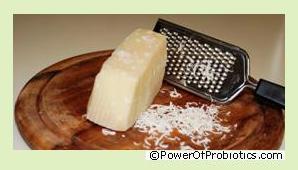Lactobacillus rhamnosus: Probiotic Bacteria with Impressive Health Benefits
Lactobacillus rhamnosus (L. rhamnosus) is one of several species of probiotic bacteria that has an impressive resume’ of health benefits. This is one species that certainly has some strain-specific health benefits and attributes, so if you are interested in it, you should decide if you need to consume one of the specific strains.
What is Lactobacillus rhamnosus ?
L. rhamnosus is Gram-positive, non-motile, non-sporulating rod-shaped facultative anaerobic lactic acid bacterium (see my microbe page) and is frequently isolated from the human gastrointestinal mucosa, starting in the mouth, of healthy individuals. It is also present in the female vagina and urinary tract.
As you have read on pages of this website for other species of probiotics, prior to DNA analysis it was difficult to determine which species a microbe belonged to because the differences in some cases are minor, and this difficulty caused confusion in classifying microbes. Lactobacillus rhamnosus (or L. rhamnosus for short) had a confusing history because it was originally considered to be a subspecies of Lactobacillus casei. And some of its strains were originally thought to be L. fermentum or L. reuteri. Doing research on this species is a bit challenging!
Modern genetic research found it to be a species of its own, with its own benefits, and found that different strains had varied characteristics. The health benefits of the most common strains are discussed on the individual-strain pages at the bottom of this page.
Concerns about Lactobacillus rhamnosus
L. rhamnosus has been shown to translocate from the intestines in mice to the spleen and liver, and has caused rare, but serious infections in severely ill people. Thus, the potential for an infection in immune-system-compromised people exists.
Another concern is that this probiotic species has antibiotic-resistance to kanamycin, not because of transferrable genes, but because of the way the microbe is made. It is just naturally resistant.
What Products Contain Lactobacillus rhamnosus ?
Some strains of this species are marketed as probiotics and/or used in dairy products such as yogurt, cheese and fermented milks. Some strains are used in fermented meat products, fermented dry sausages, and fermented soy cheeses (particularly in southeast Asia). This species also has many industrial uses. One of those uses is to transform the waste from bioethanol production into animal feed.
Since L. rhamnosus strains are naturally found in foods,
consumption of those foods would give you some benefit. For instance, a study
on Parmigiano Reggiano cheese showed that it can have up to 10
million CFU of viable lactic acid bacteria per gram of product when you eat it. What a delicious way to get beneficial bacteria!
And although the strains of L. rhamnosus may vary from cheese producer to cheese producer, the fact that some obscure, currently undocumented strains have acid- and bile tolerance in lab tests means that someday those obscure strains could be classified as probiotics.
And you could be obtaining those obscure strains today just by eating natural, chunk Parmigiano Reggiano cheese! Of course, you can find food products fortified with L. rhamnosus strains and supplements with L. rhamnosus in them, too.

Many strains of Lactobacillus rhamnosus have been researched, and some of them are radically different than the type strain. So although all L. rhamnosus strains have many things in common, some of them are different enough to have different effects in your body. If you desire a particular effect, be certain to get the correct strain. Some of the most researched strains are listed below:
- L. rhamnosus GG, also known as "LGG"
- L. rhamnous GR-1
- L. rhamnosus HN001
- L. rhamnosus DR20
- HOWARU rhamnosus
- L. rhamnosus ATCC 7469
To go back to the Lactobacillus page, click here.
I research studies and share my clinical experience to write this free site to help you find solutions to your problems. As part of that, I recommend products and services that I genuinely believe will be of help to you. If you click on a link to a product/service, I may receive a small commission to support my efforts if you buy something. The item does not cost you more.
Thanks for visiting this site! If you've enjoyed reading this page or have found the information to be useful to you, please "like", tweet about it, or share it so others can benefit, too. You can leave comments below via Facebook or Disqus.
Comment with Disqus (including as a guest), Twitter or Google accounts:
If you are one of my many readers without a Facebook account, you can still comment.
Disclaimer: Please note: By law, I cannot provide any personalized recommendations for your specific health concern on this site. The information contained in this site is educational in nature and is not intended as diagnosis, treatment, prescription or cure for any physical or mental disease, nor is it intended as a substitute for regular medical care. Consult with your doctor regarding any health or medical concerns you may have.
Subscribe to my monthly newsletter and receive a free copy of "How to Use Probiotics to Lose Weight and Be Healthier".

To comply with the EU's GDPR data privacy regulation, please subscribe here:
Looking for some quality professional supplements, including probiotics? Check out my online dispensary, as I will be doing reviews of some of these products in the future. Click on the Fullscript picture. (Note: If you were a former Wellevate customer, please switch to Fullscript for a better customer experience. Thanks!)
Some competitors of SBI (Solo Build It) are posting fake negative reviews of SBI. If you are considering creating your own website business, or if you have a brick-and-mortar business but want an online presence, I highly recommend SBI!





Comment with Facebook!
I'd love to hear your opinion about what you just read. Leave me a comment in the box below! Other commenting options follow the Facebook comments.